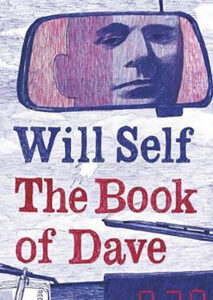
The belief that the Christian Bible represents the definitive word of God is a difficult wafer to swallow for agnostics, atheists, and polytheists — not to mention all the other infidels.
But then all monotheist interpretations cancel each other out. They also gloss over or ignore the historical archetypes in their texts, myths often traceable back to ancient civilizations like the Assyrians, Hittites, Babylonians and Greeks. Why should the Immaculate Conception be any more or less believable than the Zeus-as-swan and Leda story?
If you’re curious how these archetypical stories metamorphose over generations, you can consult the many historical texts on the subject. Or, you could have a lot more fun reading Will Self’s new novel, The Book of Dave.
Self emerged as the bete-noir of English fiction with his 1991 collection of short stories, The Quantity Theory of Insanity. His twin novellas, Cock & Bull, appeared the following year, allegedly written over a drug-fueled weekend. As his career in fiction and journalism bloomed, so did Self’s appetite for drugs, both as literary fodder and escape valve. Self even authored several essays about what he called “the social and spiritual value of intoxication.”
But when he was discovered snorting heroin on Prime Minister John Major’s plane while covering the 1998 election, his infamy threatened to eclipse the notoriety of his work. Self was becoming Britain’s Hunter Thompson, only with a better vocabulary and fewer firearms.
Self sobered up and began writing substance-free prose. Where his previous novels were criticized because plot seemed an afterthought to his audacious conceits and literary pyrotechnics, The Book of Dave melds the three into Self’s most assured and fleshed-out novel yet.
In alternating chapters, Self recounts the story of an embittered, turn-of-the-century London cabbie — Dave — and the journal he keeps, which 500 years later winds up as the holy book for a primitive, post-apocalyptic society. Dave’s anger over an ugly child custody battle informs the journal’s tone, and he chronicles his fares and routes with disdain so palpable it’s practically another passenger. London’s class-stratified neighborhoods and Gordian knot gridlock always figure prominently in Self’s fiction, but you don’t need a cabbie’s street savvy to appreciate the absurdity of city life inherent in comic lines like, “there were hotels so big other hotels could have checked into them.” But through Dave’s bigoted and misogynistic eyes, the city’s growing sprawl and racial miscegenation only furthers his own confusion.
No wonder then that the book’s futuristic chapters are more dark ages than Cyberpunk. Self describes a world where global warming has turned England into a series of islands and destroyed most written knowledge. Civilization and faith are based almost entirely on the profane ramblings in Dave’s bilious journal, dug up centuries past from the Hampstead garden where he buried it.
As a result, the sky is a “windscreen” and the moon a “foglamp”. The day divides into three “tariffs” and the era pre-dating the ecological catastrophe is the “MadeinChina” period. Divinity has become “Davinity”, souls are “fares”, and people greet each other with the salutation “Ware2, guv?” Dave’s domestic difficulties have become the basis for the weekly “changeover,” when fathers and mothers — who inhabit separate homes — shuttle their offspring back and forth.
Self’s prodigious imagination gets free reign in these chapters, which are written in a half-mockney, half-computer language dialect. It can be slow sledding at first, and he even includes a glossary of terms to ease the transition. Luckily, it doesn’t take long to get into the flow, which is like getting your ear around the accents in a Mike Leigh or Ken Loach film.
It’s well worth the initial patience for Self’s Swiftian satire on religious beliefs, which is the novel’s chief conceit. Fundamentalists of all stripes will be offended (when are they not?), but Self isn’t mocking faith so much as the random nature of its trappings. As he writes, people need these stories to “spit in the face of an indifferent nature” — it’s no accident Self’s chosen a flood. This one may be man-made, but there’s no shortage of flood-story archetypes throughout history.
But The Book of Dave isn’t some nihilistic screed; Self argues that what we do in this life does matter. Not for such nebulous concepts as our soul or the after-life, but for something much more tangible: The legacy we leave behind for future generations.
